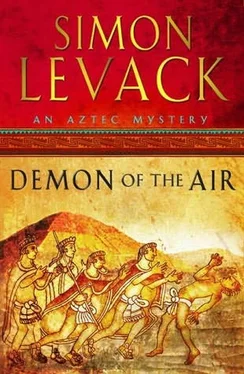Simon Levack - The Demon of the Air
Здесь есть возможность читать онлайн «Simon Levack - The Demon of the Air» весь текст электронной книги совершенно бесплатно (целиком полную версию без сокращений). В некоторых случаях можно слушать аудио, скачать через торрент в формате fb2 и присутствует краткое содержание. Год выпуска: 2012, Издательство: St. Martin, Жанр: Исторический детектив, на английском языке. Описание произведения, (предисловие) а так же отзывы посетителей доступны на портале библиотеки ЛибКат.
- Название:The Demon of the Air
- Автор:
- Издательство:St. Martin
- Жанр:
- Год:2012
- ISBN:нет данных
- Рейтинг книги:4 / 5. Голосов: 1
-
Избранное:Добавить в избранное
- Отзывы:
-
Ваша оценка:
- 80
- 1
- 2
- 3
- 4
- 5
The Demon of the Air: краткое содержание, описание и аннотация
Предлагаем к чтению аннотацию, описание, краткое содержание или предисловие (зависит от того, что написал сам автор книги «The Demon of the Air»). Если вы не нашли необходимую информацию о книге — напишите в комментариях, мы постараемся отыскать её.
The Demon of the Air — читать онлайн бесплатно полную книгу (весь текст) целиком
Ниже представлен текст книги, разбитый по страницам. Система сохранения места последней прочитанной страницы, позволяет с удобством читать онлайн бесплатно книгу «The Demon of the Air», без необходимости каждый раз заново искать на чём Вы остановились. Поставьте закладку, и сможете в любой момент перейти на страницу, на которой закончили чтение.
Интервал:
Закладка:
So my master had nothing to reproach me with. I told myself this as I scurried fretfully through the few streets leading from the marketplace to his house. I was muttering it under my breath, hoping to convince myself that the Chief Minister might see it the same way, when I turned into the path bordering the canal that ran by his house and bounced off a large man hurrying in the opposite direction.
“Out of the way, you clumsy …!”
“Sorry,” I began, before another voice, one that I knew only too well, interrupted both of us.
“Yaotl! There you are, you termite! We’ve been looking all over the city for you!”
Disbelief and a renewed sense of life’s unfairness made me groan. I looked again at the large man, noting the cudgel in his paws, and at his fellows, who looked as if they had been hewn from lumps of granite, and finally at the man in their midst, the owner of the familiar voice, no less fearsome than his escort.
He wore a yellow cloak with a red border, flowing about his calves as only the best cotton could, and tubular plugs in his ears. White ribbons bound his hair firmly at the nape of his neck. His body was stained black, like a priest’s. Yellow sandals with oversized straps adorned his feet. His appearance would have told anyone what he was: a distinguished warrior whose achievements had been rewarded by high office. A knowledgeable observer would have known that he was one of the Constables, who kept the peace in the city by executing those whom the judges had condemned. He might have been able to name the man’s office- Atenpanecatl, Guardian of the Waterfront. He would certainly have known that this official’s escortwould be only too happy to use their cudgels at their leader’s whim.
I needed no observer to tell me any of that, however. I would have known it without seeing the cloak or the ornaments or the bodyguards. As much as I might wish to, I could scarcely fail to recognize my own brother.
“Mamiztli,” I responded coolly, with his bodyguards glaring down at me and no doubt wondering whether they were supposed to bow before me or bash me over the head. “This is a rare honor. Since when have the Constables handed messages to the Chief Minister’s slave in person?”
My brother’s name suited him. It meant “Mountain Lion.”
“More honor than you think, brother,” Lion assured me. “It’s not Lord Feathered in Black we’ve come for. It’s you.”
“It will have to wait.” I glanced warily up at his escort. “I can’t keep the Chief Minister waiting, you know that.”
“Oh yes you can. It is not I that wants to see you.”
“Then who …?” But I knew the answer, and the knowledge was like a cold claw suddenly twisting my entrails. What man’s summons could take precedence over the Chief Minister’s?
“Why, the Emperor, of course. Congratulations, brother! You’ve succeeded in attracting the attention of Lord Montezuma!”
5
Lion and I grew up in Toltenco, at the edge of the rushes at the southern limit of the city. Our house had two rooms and a little walled yard with a dome-shaped bathhouse. The walls were daubed with mud and whitewashed until they gleamed, and roofed over with thatch so old you could no longer see it for moss. We were commoners: my family’s womenfolk made paper for a living. It was not very good paper: only the sort of cheap, coarse stuff that got burned in people’s hearths as an offering.
For all that, both my eldest brother and I had seemed destined for great things. He was the great warrior in the making, ferocious, strong, brave and fast, certain to drag home many illustrious captives, provided he did not meet a Flowery Death first. I had none of his gifts, although I was smart and had a tongue nimble enough to talk us out of trouble as quickly as my brother’s bravado and hot temper got us into it.
However, I had one other advantage that, from the outset, set me apart from all of my brothers: my birthday. I was born on One Death, in the year Nine Reed. It was a day so auspicious that I was pledged to the service of the gods almost from birth. How my father could afford to feast the Head Priest well enough to persuade him to let me into the Priest House was something I never knew, because he would never tell me just what it had cost him, although he used to hint at it often enough to show how bitterly he resented it. It must have been one of his proudest days when, seven years later, wearing an old, frayed maguey fiber mantle, made by cutting one of my grandfather’s cloaks in half, and a breechcloth that I had only just learned to tie myself, I went to live among the richly adorned sons of the nobility in the House of Tears. Twenty years after that the priests expelled me, and I was home again.
My family took me in out of duty, but never forgave me for their disappointment or the shame I had brought upon them or the wealth they had squandered on my education. There was some kindness at home, but there were insults too, and petty humiliations and cold silences, and when I was not being berated with my failure as a son and my ineptitude with a canoe paddle or a digging stick, I was wallowing in self-pity and self-reproach.
Small wonder that I soon fled from my parents’ house into the secret, soft-edged world of the sellers and drinkers of illicit sacred wine.
My mother sent me to the market to sell her wares. She never saw the proceeds.
Even in a city where drink was the preserve of a few-priests, four-captive warriors and the very old-and where being found drunk could cost you your life, there were many places where your troubles could be dissolved in exchange for a few cocoa beans: innocuous-looking stalls in the local markets, nondescript houses by narrow canals, secret spaces among the tall rushes at the edges of thelake. At one of these places a man I had known slightly pressed a gourd into my hands, and when we had emptied it I returned the favor. I did not go home that night.
For a while I lived in the marshes at the lake’s edge, scraping scum off the surface of the water for local dealers who made it into cakes for sale in the market. As often as not they paid me in kind, with the roughest sacred wine I ever tasted. I kept myself going that way for a while, ignoring the great city, whose effluent I spent my days wading in, so long as it ignored me. We might have gone on like that forever if I had not been caught raving in the streets, out of my head on the dregs of a cast-off gourd.
I was arrested for the crime of being found drunk in public, and for a former priest there could normally be only one penalty for that: to be executed publicly by the Constables in the Heart of the World.
I lived only because my brother interceded with the judges. He persuaded them that, although I had once been a priest, I was still a commoner, and so should be punished only as a commoner. A noble or a serving priest would have been cudgeled to death. My brother spared me that, but not my humiliation: the Emperor’s ritual admonition before a great crowd of my fellow Aztecs, followed by the shaving of my head.
Lion insisted on inflicting the lesser punishment on me himself, and carried out the sentence with evident relish. The strong arms that hauled me up by the hair and then cut it all away were his and it felt at the time as if he would have taken my scalp too if he had been allowed to.
At the time, I would rather have died. Any Aztec would. I never forgave my brother for saving my life, any more than he and the rest of my family forgave me for blighting theirs. When I sold myself into slavery, I thought I was turning my back on them once and for all.
Even with night about to fall, the palace’s entrance and the space around it were choked with people. The lord of a foreign city on a state visit, bedecked with feathers, jade and gold, had to mingle with the litigant whose argument with his parish over a land grant had found its way into the court of appeal, with the seasoned warrior claiming his right to be fed at the palace and with the special envoywhose voluminous ceremonial jacket entangled his neighbors’ elbows. They made a colorful crowd, shuffling slowly, mostly silently, toward the entrance, to be admitted or dismissed as the stewards saw fit.
Читать дальшеИнтервал:
Закладка:
Похожие книги на «The Demon of the Air»
Представляем Вашему вниманию похожие книги на «The Demon of the Air» списком для выбора. Мы отобрали схожую по названию и смыслу литературу в надежде предоставить читателям больше вариантов отыскать новые, интересные, ещё непрочитанные произведения.
Обсуждение, отзывы о книге «The Demon of the Air» и просто собственные мнения читателей. Оставьте ваши комментарии, напишите, что Вы думаете о произведении, его смысле или главных героях. Укажите что конкретно понравилось, а что нет, и почему Вы так считаете.












